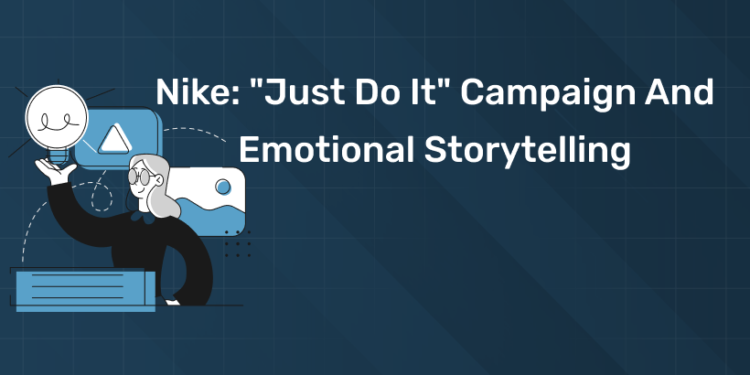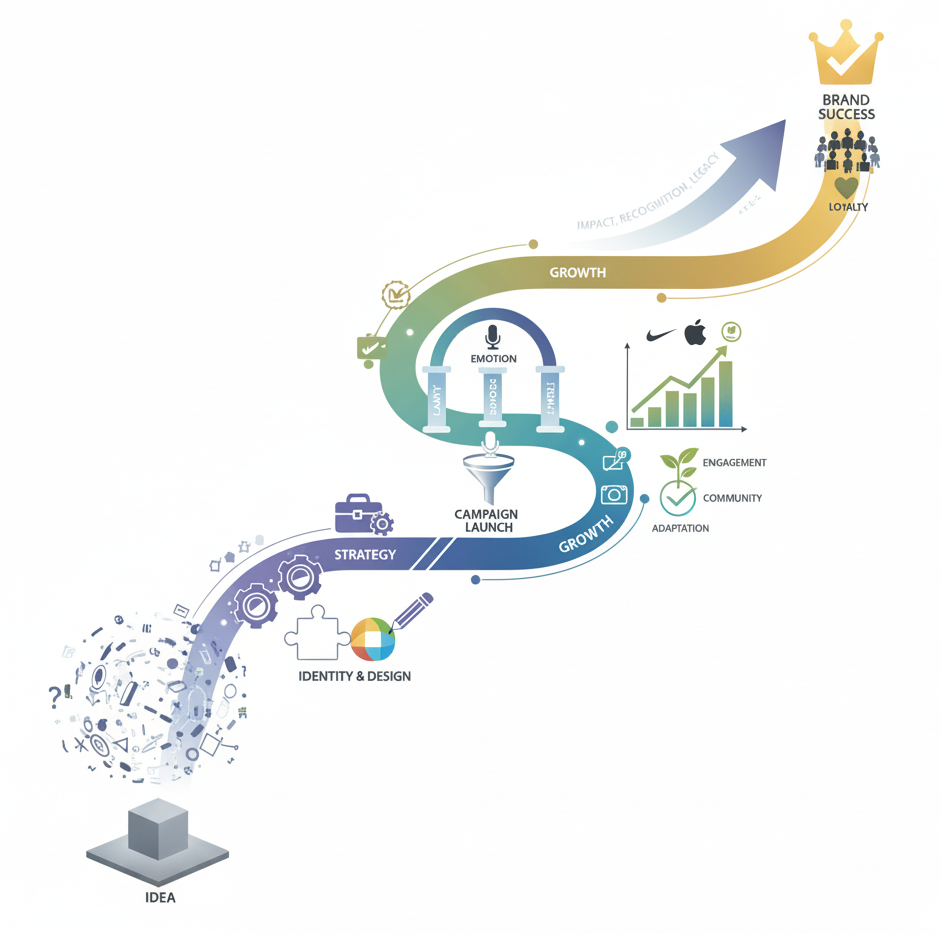Table of Contents
Introduction
Nike’s “Just Do It” isn’t just a slogan, it’s a cultural phenomenon that has gone beyond sports marketing. Launched in 1988 this phrase has become the definition of motivation, determination and going for it. At the heart of this campaign is emotional storytelling. This has not only positioned Nike as a leader in the sportswear industry but has created a deep and lasting connection with the consumer. In this post we will look at the history of the “Just Do It” campaign, emotional storytelling, celebrity endorsements, multi channel marketing and finally the psychological impact and legacy of this campaign.
The History of “Just Do It”
1: What is the primary goal of SEO (Search Engine Optimization)?
The origins of the “Just Do It” campaign go back to a 1988 meeting between Nike’s advertising agency Wieden+Kennedy and the company’s executives. The phrase was inspired by the last words of Gary Gilmore, a convicted murderer who before his execution said “Let’s do it”. This stark and unapologetic phrase was turned into a call to action that resonated with athletes and non athletes.
The campaign launched with a series of ads featuring everyday people doing various sports and physical activities. A middle aged man jogging, a young woman training for a marathon, the visuals were relatable and encouraging. The message was clear: anyone could achieve their goals regardless of their background or current fitness level. This inclusivity was key to the campaign’s success and made it accessible to a wide audience.
Become an AI-powered Digital Marketing Expert
Master AI-Driven Digital Marketing: Learn Core Skills and Tools to Lead the Industry!
Explore CourseEmotional Storytelling: The Core of the Campaign
Emotional storytelling is at the heart of Nike’s marketing. Unlike traditional advertising that focuses on product features and benefits Nike’s approach taps into the emotions and aspirations of the audience. The “Just Do It” campaign tells stories of perseverance, triumph and the human spirit.
One of the most famous ads from this campaign features athletes overcoming big obstacles. The 2018 ad featuring Colin Kaepernick highlights social justice and personal sacrifice. By weaving powerful narratives with the brand message Nike gets us to feel deeply.
This is key. Research shows we engage more with brands that tell stories. Nike has got this down to a fine art by telling stories that inspire and activate. The “Just Do It” slogan is a call to action, get us to overcome and go for it.
Celebrity Endorsements
Celebrity endorsements have been a big part of the “Just Do It” message. By partnering with high profile athletes Nike have been able to reach a wider audience. Icons like Michael Jordan, Serena Williams and LeBron James have embodied the spirit of the campaign, each representing different parts of determination and success.
Michael Jordan’s partnership with Nike in the mid 80s changed the game of sports marketing. His story of overcoming adversity to become one of the greatest basketball players of all time fits perfectly with the “Just Do It” message. The Air Jordan line not only took Nike to new heights but also set the template for future brand athlete partnerships.
Serena Williams is also an example of emotional storytelling in Nike’s marketing. In a 2018 ad she talks about being a female athlete and a mother and women all around the world can relate. By showing the personal struggles of these athletes Nike is reinforcing its commitment to empowerment and inclusivity.
Multi-Channel Marketing and Global Reach
Another part of the “Just Do It” campaign is Nike’s multi-channel marketing. The brand has used various channels—TV, social media, print and digital advertising—to communicate its message. Each channel is designed to engage audiences in different ways and creates a cohesive narrative that spans demographics.
Social media has become a key tool for emotional storytelling. Nike’s presence on Instagram and Twitter allows real time engagement with consumers. The brand shares great stories and encourages user generated content and creates a sense of community with its customers. #JustDoIt has become a rallying cry for people sharing their fitness journeys.
Also Nike has expanded its global reach through localised campaigns. By adapting the “Just Do It” message to different cultures and communities the brand ensures its emotional storytelling is relevant everywhere. This flexibility has been key to Nike becoming the global leader in sports marketing.
Become an AI-powered Digital Marketing Expert
Master AI-Driven Digital Marketing: Learn Core Skills and Tools to Lead the Industry!
Explore CourseThe Psychology of “Just Do It”
The psychology of the “Just Do It” campaign is powerful. By talking empowerment and resilience Nike is tapping into the consumers’ intrinsic motivation. The slogan makes people push their limits and pursue their passions and creates a sense of urgency and purpose.
Psychology studies show that motivation is key to achieving goals. The “Just Do It” mantra is a reminder that action is required to get results. It’s especially relevant in tough times and is a ray of hope and encouragement.
Also it creates a sense of belonging. By featuring diverse athletes and everyday people Nike is creating an inclusive community where everyone feels seen and heard. This sense of belonging can lead to greater customer loyalty as people will support brands that reflect their values and lives.
Results
See for yourself. Nike has grown and won. Since the campaign launched they have outperformed everyone else and “Just Do It“ is one of the most famous phrases in advertising ever.
Financially, Nike has witnessed a phenomenal increase in sales since the campaign. $44 billion in 2020. That‘s what emotional storytelling and marketing gets you. And the stock price has gone up. Investors believe in Nike‘s ability to connect with consumers.
Beyond the numbers the legacy of the “Just Do It“ campaign is in its cultural impact. The phrase has gone beyond sports and into the broader cultural conversation. It means determination and resilience. It‘s inspired millions to take action, chase their dreams and face their fears.
Stop Guessing. Start Building. Download the Proven Brand-Building Playbook
Marketers Takeaways
The “Just Do It“ campaign shows us:
Use Emotional Storytelling: Connect with your audience emotionally. Share real stories that speak to their experiences, hopes, and challenges.
Use Celebrity Endorsements Wisely: Partner with people who embody your values. Their stories will amplify your message and reach.
Multi-Channel Marketing: Engage with your audience across all channels. Same brand narrative across all channels but tailored content for each.
Build Community: Create a sense of belonging with your customers. Encourage user generated content and interaction to build loyalty and brand advocacy.
Be Adaptable and Local: Be responsive to cultural differences. Adapt your messaging to different audiences so it‘s relevant and inclusive.
To know more about digital marketing course in Entri app
Conclusion
The “Just Do It“ campaign is a lesson in emotional storytelling and marketing. By speaking to the hopes and fears of people they have created a story that inspires action and connection. The legacy of the campaign isn‘t just the numbers but the millions of people around the world who are doing it no matter what.
We marketers can look at Nike for inspiration. Using emotional storytelling, celebrity endorsements, and community, we can connect with our audience beyond the ad. Authenticity and emotion make a mark in a noise-filled world, so let’s just do it as Nike says.
Frequently Asked Questions
What inspired the creation of the "Just Do It" slogan?
The “Just Do It” slogan was inspired by the last words of Gary Gilmore, a convicted murderer who famously said, “Let’s do it” before his execution. The phrase was adapted by Nike’s advertising agency, Wieden+Kennedy, to create a motivational and inclusive message that resonates with both athletes and everyday individuals. The goal was to encourage people to take action toward their goals, regardless of their circumstances.
How has emotional storytelling shaped Nike's marketing strategy?
Emotional storytelling is at the heart of Nike’s marketing approach. Rather than focusing solely on product features, Nike crafts narratives that emphasize personal struggles, triumphs, and the journey of athletes. These stories connect with audiences on a deeper emotional level, fostering loyalty and engagement. By showcasing relatable experiences and inspiring journeys, Nike encourages consumers to see themselves in the brand’s message.
Can you provide examples of emotional storytelling in Nike's ads?
One notable example is the 2018 ad featuring Colin Kaepernick, which centered on themes of social justice and perseverance. The ad depicted Kaepernick’s journey and sacrifices, resonating with audiences who value activism and integrity. Another example is the “Dream Crazier” campaign featuring Serena Williams, which highlighted the challenges faced by female athletes. Both ads utilized powerful narratives that evoke strong emotional responses, reinforcing Nike’s brand identity.
What role do celebrity endorsements play in the "Just Do It" campaign?
Celebrity endorsements are crucial for amplifying the “Just Do It” message. Nike collaborates with high-profile athletes like Michael Jordan, LeBron James, and Serena Williams, who embody the campaign’s spirit of determination and resilience. These endorsements not only enhance brand visibility but also lend credibility to the message, as these athletes have their own compelling stories of overcoming adversity and achieving greatness.
How does Nike utilize multi-channel marketing to promote the "Just Do It" campaign?
Nike employs a comprehensive multi-channel marketing strategy to reach diverse audiences. The brand uses television commercials, social media platforms, digital advertising, and print media to disseminate its message. Each channel is tailored to maximize engagement, with social media allowing for real-time interaction and user-generated content. This cohesive approach ensures that the “Just Do It” message is accessible and relevant across various demographics and regions.
What is the psychological impact of the "Just Do It" campaign on consumers?
The psychological impact of the “Just Do It” campaign is profound. The slogan encourages individuals to take action and pursue their goals, fostering a sense of urgency and empowerment. Research in psychology indicates that motivational messages can significantly influence behavior and mindset. Additionally, the campaign helps cultivate a sense of belonging among consumers, reinforcing community and shared values through the stories of athletes and everyday individuals.
How has the "Just Do It" campaign contributed to Nike's financial success?
Since its launch in 1988, the “Just Do It” campaign has significantly contributed to Nike’s financial success. The brand has consistently outperformed competitors, with revenues exceeding $44 billion in recent years. The campaign’s strong emotional connection with consumers has driven brand loyalty and engagement, resulting in increased sales and market share. The slogan has also become one of the most recognized phrases in advertising, further solidifying Nike’s position as a market leader.
What lessons can marketers learn from Nike's "Just Do It" campaign?
Marketers can draw several lessons from Nike’s successful campaign:
- Emphasize Emotional Storytelling: Create narratives that resonate with your audience’s experiences and aspirations.
- Leverage Influential Partnerships: Align your brand with credible figures who embody your values to enhance your message.
- Utilize Multi-Channel Approaches: Engage consumers across various platforms to maximize reach and impact.
- Foster Community: Encourage interaction and user-generated content to build brand loyalty.
- Adapt to Local Cultures: Ensure your messaging is relevant and inclusive by understanding cultural differences.
How has the "Just Do It" slogan evolved over the years?
While the core message of “Just Do It” has remained consistent, its application and context have evolved. Over the years, Nike has adapted the slogan to address contemporary issues such as social justice, gender equality, and mental health. Campaigns featuring athletes like Colin Kaepernick and Serena Williams reflect a broader societal conversation, positioning Nike not just as a sports brand but as a champion of progressive values.
What is the long-term legacy of the "Just Do It" campaign?
The long-term legacy of the “Just Do It” campaign lies in its cultural impact and the way it has redefined sports marketing. The slogan has become a symbol of determination and resilience, inspiring countless individuals to pursue their dreams. Its transformative approach to emotional storytelling has set a benchmark for brands across industries, demonstrating the power of authentic narratives in building connections and driving consumer engagement. As a result, “Just Do It” remains one of the most iconic and enduring marketing slogans in history.












